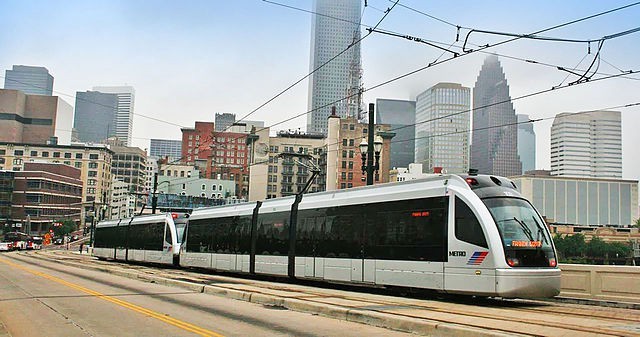For decades, the drive to expand mass transportation options in and around the city of Houston has been similar to the traffic: a slow, dull slog. Funding has been blocked by state and federal officials at nearly every turn as they favored pouring concrete to alternative solutions.
But, the annual Kinder Houston Area Survey released earlier this year gave us our first glimpse of how desperate Houstonians are for better options than simply building more and bigger roads. For the first time since Hurricane Harvey, transportation was the No. 1 concern of residents, overtaking flooding and crime. No wonder, Houstonians spend more time on the road getting to and from work than any other city in America.
Tuesday's $3.5 billion bond referendum from METRO was the first test to see just how willing voters were to hand over a massive amount of money to the transportation organization with the promise of more, newer and more innovative forms of transportation for the city. And voters spoke — approving the measure by a landslide 74 to 26 percent.
It was a resounding reminder to local officials that drivers in Houston aren't kidding when they say they want something more than just climbing in a car every day and driving an hour to work.
It is an interesting contrast as well to foes of anything mass transit (often comparing it somehow to European socialism) who have said the city wants to drive. Former Congressman John Culberson was practically giddy every time the chance came up to block federal funding for light rail. And light rail has been so hated by certain politicians that it was required that the new rapid bus transit service in the Galleria area could only be built if it was designed so rails could never be laid in its place, apparently in the fear that rapid bus service was some kind of a gateway drug to more light rail.
Granted, the MetroNext plan, as it has been dubbed, will cover a lot more than just rail. In fact, it invests heavily in rapid bus service, particularly of the commuter variety. But, with the $3.5 billion approved by voters and another $4 billion expected to be added, there is plenty of room for growth and expansion, something Houston drivers clearly crave.
Support Us
Houston's independent source of
local news and culture
account
- Welcome,
Insider - Login
- My Account
- My Newsletters
- Contribute
- Contact Us
METRO Election Win Underscores Houston's Hunger for Better Mass Transit

Photo by Jackson Myers
Expanded light rail is among the plans now that the MetroNext referendum passed.
[
{
"name": "Related Stories / Support Us Combo",
"component": "11591218",
"insertPoint": "4",
"requiredCountToDisplay": "4"
},{
"name": "Air - Billboard - Inline Content",
"component": "11591214",
"insertPoint": "2/3",
"requiredCountToDisplay": "7"
},{
"name": "R1 - Beta - Mobile Only",
"component": "12287027",
"insertPoint": "8",
"requiredCountToDisplay": "8"
},{
"name": "Air - MediumRectangle - Inline Content - Mobile Display Size 2",
"component": "11591215",
"insertPoint": "12",
"requiredCountToDisplay": "12"
},{
"name": "Air - MediumRectangle - Inline Content - Mobile Display Size 2",
"component": "11591215",
"insertPoint": "4th",
"startingPoint": "16",
"requiredCountToDisplay": "12"
}
,{
"name": "RevContent - In Article",
"component": "12527128",
"insertPoint": "3/5",
"requiredCountToDisplay": "5"
}
]

